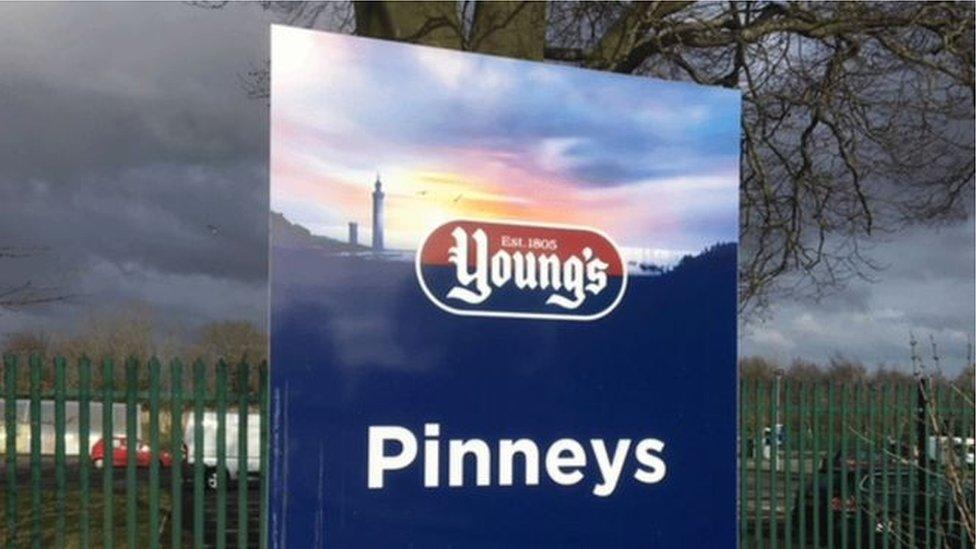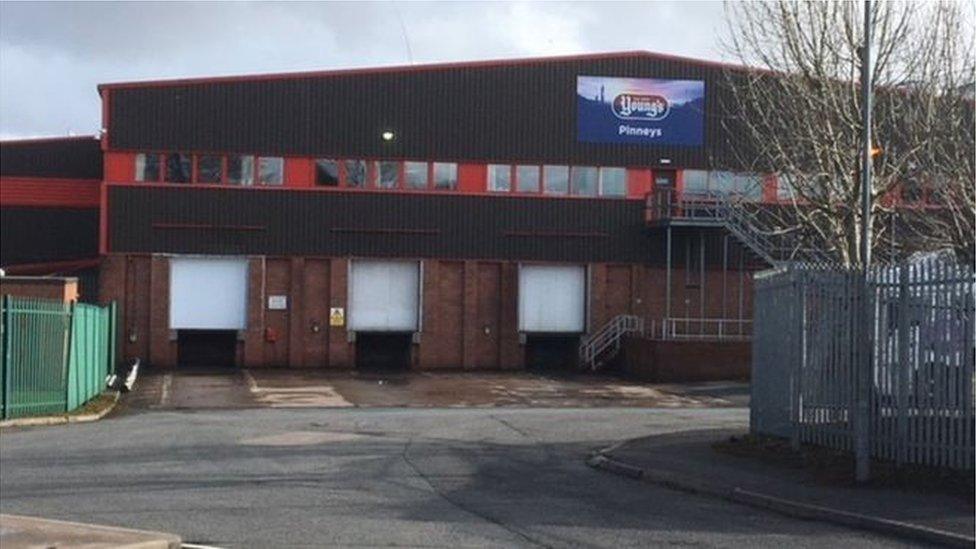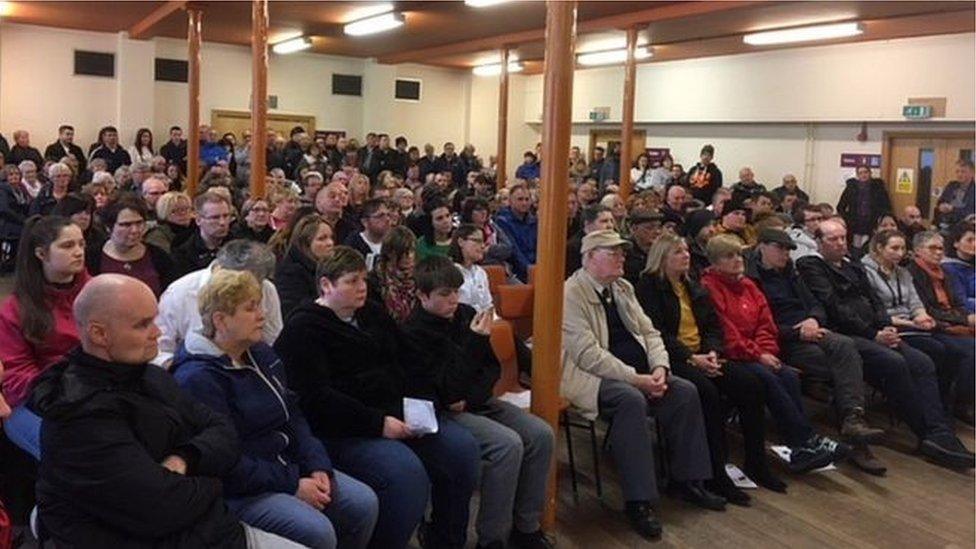The economy: Going south
- Published

We've seen plenty plant closures, but Pinneys feels different - like a throwback to the era of company towns.
The seafood processor hasn't been the only employer in Annan. There's the boilerworks, now much diminished. The "shrimpie" goes on, also under the ownership of Young's Seafood and taking on workers.
And there was Chapelcross, the nuclear power plant, now only employing those in the long-term business of dismantling it.
So with 450 employees in a rural town of 10,000 souls, the announcement of Pinney's closure was both a shock and an unusually big blow.
The usual formulaic union secretary's quotes about "devastation", "a community betrayed" and, from September onwards "a bleak Christmas for local families" have lost their force through repetition. It is also because workforces are dispersed, and so is the impact.
However, the few large plants in rural areas are different. There are fewer alternative nearby jobs. It's another way of telling young people leaving school that their future lies elsewhere.
Wiggle room
The legal requirement to hold a consultation with the workforce is often a cruel hoax. They're not trying to find out if people have any better ideas. By the time the bosses at Young's Seafood (or the 2 Sisters Food Group in Cambuslang) are consulting, the decision is already made.
Local politicians and government ministers can meet management and talk up hopes of a rescue plan, or of new contracts to get things going again. But it's been made very clear that Young's has absolutely no intention of seeking new contracts for Pinneys.

The statement agreed with Business Minister Paul Wheelhouse was craftily worded to give the impression of co-operation but with sufficient wiggle room not to give any. Young's will sell the plant to another owner, and possibly at a knock-down rate. But that's it.
Its corporate mind has already moved on from Pinney's. Next stop: recruitment in Grimsby, its headquarters town, where much of the Pinneys work to supply M&S Food is being transferred (some of the other work is going to plants at Carlisle, Uddingston and Arbroath).
Catching up
The closure is a reminder of the precarious nature of the rural economy, and particularly one with a big old plant doing easily transferred work.
Pinneys is not in Annan because that's where the farmed salmon are. I'm told it's there because the late Mr Pinney liked living in the area.
It's also a reminder that the south of Scotland has lacked much co-ordination down the years to do anything about it.
Monday could mark a turning point.
At 7pm, in the Auld Cross Keys Inn, in Denholm, Professor Russel Griggs gets to his feet and begins a series of 28 meetings across southern Scotland.
These are to make and to hear the case for getting the south of Scotland's economic act together. At 8.30am on Tuesday, he'll be at the Heart of Hawick. Eight of the meetings are for early birds.
The seasoned businessman is chairman of the board that is paving the way for a new enterprise body for the south of Scotland.
You may recall that Economy Secretary Keith Brown set about streamlining the enterprise agencies to strip out duplication and waste, and ended up with an extra national board plus one more for the south.
It may not have been the minister's finest hour, but Russel Griggs and the numerous people on his board want to seize the opportunity to do for the south what Highlands and Islands Enterprise (HIE) and its predecessor, the Highlands and Islands Development Board (HIDB) have done for the north and west.
They've got a lot of catching up to do. HIDB started work 52 years ago.
Criminally rogue
It's worth pausing for a moment to reflect on Prof Griggs' portfolio of roles. He seems to be the go-to man for digging others out of holes.
That includes the opencast coal mines. With inadequate funds to restore them when the operators folded, the professor was asked to step in. He is nearly finished the job.

Hundreds of people attended a mass meeting over the future of Pinneys in southern Scotland
When small businesses felt they were being unfairly treated by overbearing, risk-averse, post-crash banks, the government called Griggs to mediate. He did so, with a new appeal system against loan refusals, which even the banks now prefer.
Whitehall went back to him to find a way for bank branch closures to provoke less hostility. Banks duly signed up to his code of conduct, requiring them to take their time and explain themselves.
When Lloyds Banking Group had to compensate dozens of business customers for having their companies collapsed by a criminally rogue office in Reading, it also got on the phone to Professor Griggs.
With that track record, the Sanquhar-based professor was the very guy to sort out the south.
Unmatched skills
With a new enterprise company, and eight weeks left of a Scottish government consultation, he has a nearly blank sheet. So what could it do?
The experience of HIE is that a rural economic development agency needs a social role, supporting communities. By contrast, that role doesn't trouble Scottish Enterprise, which currently has the south within its turf.
That means community facilities and institutions. It means addressing the questions of population decline and particularly of young people leaving for education, then not finding jobs back home which match their skills.
You can see an example of such a community response being funded by a very large Lottery grant in Banton, North Lanarkshire, where a community group is redeveloping the once-doomed Swan Inn.
South of Scotland Enterprise could and should build in some of the resilience necessary to handle a closure such as Pinneys. The question with big plants should always be: how can they be sustained, and what if they depart?
It could co-ordinate the limited remains of the once-great textiles industry of the Borders. It could market the area better for tourism.
There is a already a big presence for hiking and mountain-biking. What, then, of the Southwest Coastal 300, external road route, to match the huge marketing success of the North 500. If you haven't heard of it, that might be because of its marketing budget.
Dark skies
There are two plans for national parks - one for the Borders, one for Dumfries and Galloway. The latter already has its dark sky-gazing niche.
Prof Griggs talks of the distinctive economy of small and family owned businesses, including farms. They need a different type of business support, including help with the question of family or leadership succession.
The board has been discussing whether the south economy is weak or just different. It may be a bit of both. There's certainly statistical evidence of weakness.
Here are some figures compiled late last year about Dumfries and Galloway, and which you might have heard quoted on Radio Scotland by my colleague Willie Johnson (Annan-raised and covering the south-west for the BBC for more than 30 years).
It has the lowest average weekly wage of any local authority area in Scotland: £461 is £87 below the average
Nearly 31% earn less than the living wage, compared with 20% in Scotland
Self-employment or small businesses account for 55% of jobs, and 36% across Scotland
Business research and development - a very poor indicator for Scotland as a whole - is far lower in the south-west
Incompatible balls
The area has lots going for it, from Eyemouth scuba to Wigtown's books. There's a new Borders railway, and the possibility of an extension. The Glasgow-Kilmarnock-Dumfries line is also being considered for an upgrade.
But it has weaknesses too: notably in road transport. East to west links are one of the reasons this region does not feel a coherent one. Borderers look to Edinburgh or Newcastle: south-westerners to Glasgow, Belfast or Carlisle.
And that is where the challenge starts - trying to persuade southern Scots that they've got a common cause. I'm told it's hard enough to get some Borderers to think of their neighbouring town as having common interests with their own.
If this is to work, there's a need to look beyond the incompatible ball shapes kicked at goal in the Borders and at Queen of the South.